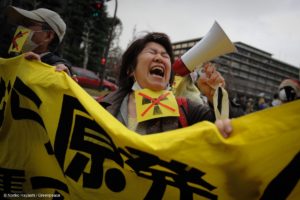On 10 October 2017, MobLab Live hosted a conversation about social ties with Professors Hahrie Han and David Karpf. Meghana Rao, a gender rights campaigner based in India, joined us and Vanessa Williamson hosted.
Our guests examined research on social ties and campaigning, their experience with (and observations of) recent global campaigns (Trump and #Resist, Brexit, gender rights in India and more) and took questions from activists and campaigners watching live.
Here are some highlights:
Resources (people, money, technology, lists) do not equal political power.
Organizations and movements often mistake resources and power. Resources–money, lists of people, commitments of support, technology–are not powerful unless they can be leveraged in a way that shapes how people make decisions. People think of power based on relationships. Social ties can be one of the most powerful campaign resources.
Social ties scale our belief–and our ability to talk about issues.
We are more likely to discuss our positions with people we trust–friends, family, and colleagues we know. Talking about our beliefs helps us refine and strengthen our commitment. And, often, these conversations help us persuade others who may not agree with us. In other words, simply talking with our social ties can be a form of organising.
Scale movements with existing structures and grow new leaders.
Meet people in groups and communities with existing social structures: Like schools, churches, unions, sports clubs and son on. Support volunteer leadership so you can scale beyond paid staff.
A strong base holds power accountable–and can shift when needed.
A strong base has three characteristics:
- It has to be committed to the fight that’s needed;
- It should be flexible enough to work on more than one issue; and
- It needs to be transformational. A powerful base is one that opens up to large-scale participation beyond single issue groups. A base needs to be more than a one-note choir.
Use digital tools to engage harder to reach and marginalised communities.
We think of social ties as one-to-one or face-to-face relationships. These are powerful ties. But the power of digital communications is scaling communication to wider audiences of marginalised people. Go beyond single engagements–getting an email address–and develop online leaders with the ability to plug into their own social and personal networks.
Organising and mobilisation are essential to reaching–and empowering–supporters and undecided people.
Rapidly scalable digital communications tools and databases help us mobilise huge lists. But we have to rely on interpersonal relationships to provide context and carry on conversations over time. These conversations, built on social ties, also let us reach and organise new and undecided supporters. Open up to groups of undecided people who may have not thought about an issue yet.
Articles, books and other resources
By Hahrie Han, Anton Vonk Professor of Political Science at the University of California, Santa Barbara.
- Want Gun Control? Learn from the N.R.A. (New York Times, 4 October 2017)
- How Organizations Develop Activists: Civic Associations and Leadership in the 21st Century (2014)
By David Karpf, Associate Professor, School of Media and Public Affairs at the George Washington University
- Analytic Activism: Digital Listening and the New Political Strategy (2016)
- The Move On Effect: The Unexpected Transformation of American Political Advocacy (2012)
By Vanessa Williamson, MobLab Live Host and Fellow, Governance Studies at the Brookings Institution
- How the Women’s March Could Have a Lasting Historical Impact (Teen Vogue, 19 January 2017)
- The Tea Party and the Remaking of Republican Conservatism (Vanessa Williamson and Theda Skocpol, 2016)
Other books
- The Making of Pro-Life Activists (Ziad W. Munson, 2009. Hahrie Han mentions this book as a must read for organisers – it explores / explains power of social relationships in organising.)
- Rules for Revolutionaries: How Big Organizing Can Change Everything (Becky Bond and Zack Exley, 2016)
Other resources / sites
- Bell Bajao / Ring the Bell (A campaign to end violence against women mentioned by Meghana Rao.)
- Finding Steady Ground (A chat participant mentioned Finding Steady Ground as a resource for activists and campaigners seeking ways to sustain their work – and spirit – when facing traumatic events.)
- Hahrie Han mentioned the cultural studies work of Stuart Hall. Here’s a recent New Yorker article about Hall’s work: Stuart Hall and the Rise of Cultural Studies.




